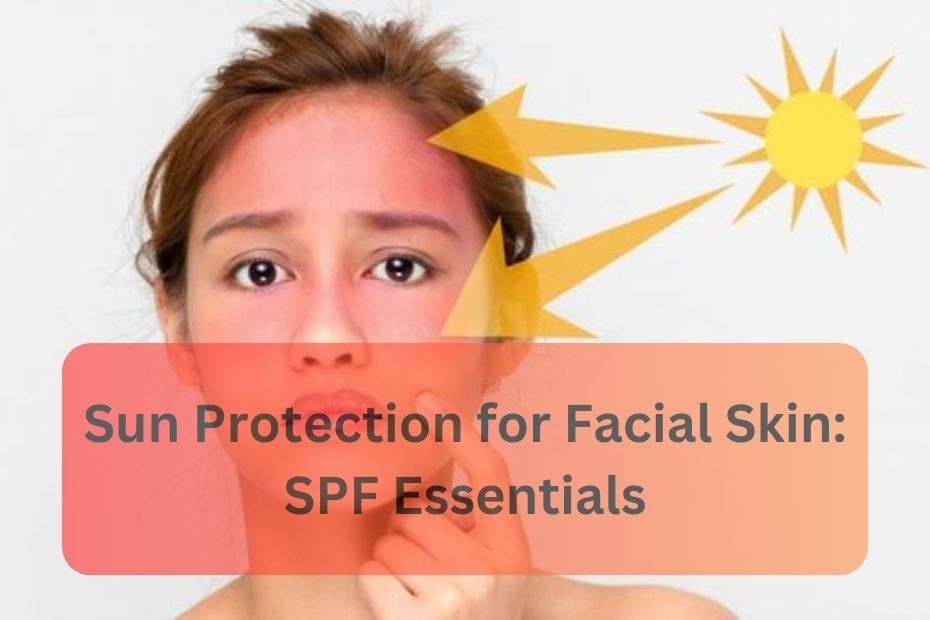Sun Protection for Facial Skin: SPF Essentials
Sun protection is essential for maintaining healthy skin and preventing premature aging. In this article, we’ll delve into the importance of sun protection for facial skin and explore the essentials of SPF (Sun Protection Factor) in skincare.
1. Introduction
Sun Protection for Facial Skin is a crucial aspect of skincare, as the face is often the most exposed area to harmful UV radiation. Sunscreen, particularly those with SPF, plays a vital role in shielding the skin from the damaging effects of the sun’s rays while preserving its youthful appearance.
2. Understanding Sun Damage
UV radiation from the sun can cause various adverse effects on the skin, including sunburn, premature aging (such as wrinkles and age spots), and an increased risk of skin cancer. Prolonged sun exposure without adequate protection can lead to irreversible damage and long-term consequences for skin health.
3. What is SPF?
SPF stands for Sun Protection Factor, which indicates the level of protection a sunscreen provides against UVB radiation, the primary cause of sunburn. Sunscreens with higher SPF values offer greater protection against UVB rays, but it’s essential to note that SPF alone does not protect against UVA radiation, which contributes to skin aging and cancer.
4. Choosing the Right SPF
When selecting a sunscreen, it’s crucial to consider factors such as your skin type, the intensity of sun exposure, and any specific skin concerns. The American Academy of Dermatology recommends using a broad-spectrum sunscreen with an SPF of 30 or higher for adequate protection against both UVB and UVA rays.
5. Applying Sunscreen Correctly
Proper application of sunscreen is key to its effectiveness. Apply sunscreen generously to all exposed areas of the skin at least 15 minutes before sun exposure. Remember to reapply every two hours or immediately after swimming or sweating, as sunscreen can wear off over time or become less effective when exposed to water or sweat.
6. Additional Sun Protection Measures
In addition to sunscreen, it’s essential to take other sun protection measures, such as wearing protective clothing, including hats and sunglasses, and seeking shade whenever possible, especially during peak sun hours between 10 a.m. and 4 p.m.
7. Sun Protection for Different Skin Types
Different skin types have varying levels of sensitivity to the sun and require tailored sun protection. Individuals with fair skin, for example, are more prone to sunburn and may need higher SPF sunscreen, while those with darker skin tones are still at risk of sun damage and should use sunscreen regularly.
8. Sun Protection for Specific Situations
Certain activities, such as outdoor sports or water activities, may require additional sun protection measures. Water-resistant sunscreens are ideal for swimming or sweating, as they provide longer-lasting protection against UV radiation.
9. Common Myths and Misconceptions
There are several myths and misconceptions surrounding sunscreen and sun protection. For example, some people believe that sunscreen is only necessary on sunny days or that applying sunscreen once a day is sufficient for all-day protection. It’s essential to dispel these myths and emphasize the importance of consistent sun protection habits.
10. The Importance of Daily Sun Protection
Sun protection should be incorporated into your daily skincare routine, regardless of the weather or season. Even on cloudy days or during winter months, UV radiation can still penetrate the clouds and cause skin damage. Consistent use of sunscreen helps to prevent cumulative sun damage and maintain healthy skin over time.
11. Choosing the Right Sunscreen Products
When choosing sunscreen products, consider factors such as your skin type, preferences, and lifestyle. Whether you prefer a lightweight lotion, a convenient spray, or a moisturizing cream, there are various sunscreen formulations available to suit your needs.
12. Sun Protection Tips for Sensitive Skin
Individuals with sensitive skin may have specific concerns when it comes to sunscreen, such as irritation or allergic reactions. Look for gentle, fragrance-free sunscreen formulations specifically designed for sensitive skin and perform a patch test before applying to the entire face.
13. Sun Protection Beyond Facial Skin
While facial skin often receives the most attention when it comes to sun protection, it’s essential to extend sun protection to other areas of the body, such as the neck, chest, and hands. These areas are also prone to sun damage and can benefit from regular sunscreen application.
14. Conclusion
In conclusion, sun protection is a crucial aspect of skincare, especially when it comes to protecting facial skin from the harmful effects of UV radiation. By incorporating SPF essentials into your daily routine and practicing sun-safe habits, you can maintain healthy, youthful-looking skin for years to come.
15. FAQs
Q1: Can I skip sunscreen on cloudy days? A: No, UV radiation can penetrate through clouds, so it’s essential to wear sunscreen even on cloudy days to protect your skin from sun damage.
Q2: How often should I reapply sunscreen? A: Sunscreen should be reapplied every two hours, or immediately after swimming or sweating, to maintain its effectiveness.
Q3: Can sunscreen cause breakouts? A: Some sunscreen formulations may clog pores and contribute to breakouts, especially for individuals with acne-prone skin. Look for non-comedogenic or oil-free sunscreen options to minimize the risk of breakouts.
Q4: Is it necessary to wear sunscreen indoors? A: While UV radiation from the sun can penetrate through windows, the risk of sun damage indoors is generally lower than outdoors. However, if you spend a lot of time near windows or under artificial lighting, consider wearing sunscreen for added protection.
Q5: Can I use expired sunscreen? A: It’s best to avoid using expired sunscreen, as its effectiveness may be compromised, and it may not provide adequate protection against UV radiation. Be sure to check the expiration date on your sunscreen products and replace them as needed.
| Home | Click Here |
| Facial | Click Here |
